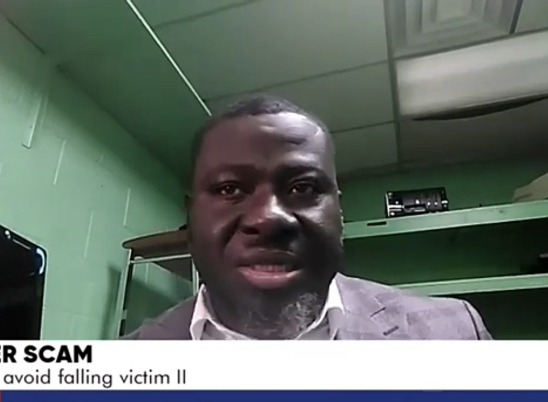
Audio By Carbonatix
The information age, also known as the new media age, comes with its positives and downsides.
Cybercrimes are predominantly one of such negatives of the era, which has been on the rise globally.
In a quest to create awareness of cybercrimes and cyberattacks, a U.S based cybersecurity expert, Yaw Ansu Gyeabour shared some tips to help people avoid falling victims.
Speaking on JoyNews’ The Law, Sunday, June 11, Mr Gyeabour noted that the whole essence of a cyber-attack is for the hacker to attain administrative privilege to the victim’s device to access salient information such as credit or debit card details.
He explained that hackers typically use cybersecurity tools to target the device from a remote location, gain access to the device, and ultimately obtain whatever information they need to commit the crime (since they usually do not have physical access to the victim's devices.)
According to Mr Gyeabour, phishing is one of the most common methods used by hackers to achieve this goal.
“[Phishing] is where you receive emails, or these days it has been transformed into text messages, and others. You receive emails from seemingly recognisable institutions that look more like, for example, coming from the Bank of Ghana.
“So, if you don't pay proper attention to it, they are requesting some salient information like your date of birth. And if you live in places like U.S. and elsewhere, they are looking at your date of birth, they are looking at your Social Security number.
“So, with the phishing, once you click on the email, there are links that you are linked to and those links are infected with malware,” the cybersecurity expert explained.
He further explained that malware is malicious software that allows the hacker to gain access to the victim’s device.
Thus, he pointed out that once an individual's device is infected with malware, it gives the hacker the ability to do whatever they desire with the victim's device.
In addition, Mr Gyeabour provided a list of some of the most commonly used malware used by hackers, such as files, keyloggers, and ransom malware (ransomware).
Per his explanation, “ransomware encrypts your data and once your data is encrypted, they (hackers) demand huge sums of money to be able to decrypt it.
He further reiterated that phishing attacks do not only take the form of an email but may also take the form of a text message or a phone call.
“So, once you receive a text or a call and there are instructions, press A, press B. Once you click on that, they have access to your system. If it is email. Once you are directed to the email and you click on the email, there are processes that they go, and they have administrative privileges over your device. And in that case, the system is infected with the malware.”
Mr Gyeabour, therefore advised individuals to be cautious of clicking on links in unsolicited messages to avoid falling victim to phishing.
Additionally, he stressed the importance of using a strong password, to avoid being a victim of what he called the dictionary or false group attack.
The cybersecurity expert noted that, “When your password is not too strong, with the dictionary attack, there are guesses using all the words in the dictionary. So once the guess goes through, it goes through simply because your password is not too strong.”
He added that once a hacker uses the dictionary attack with the aid cybersecurity tool to gain access to their victim’s device, it paves way for the hacker to infect the device with malicious malware to be able to operate their cybercrimes.
Latest Stories
-
Securing children’s tomorrow today: Ghana launches revised ECCD policy
1 hour -
Protestors picket Interior Ministry, demand crackdown on galamsey networks
1 hour -
Labour Minister highlights Zoomlion’s role in gov’t’s 24-hour economy drive
1 hour -
Interior Minister receives Gbenyiri Mediation report to resolve Lobi-Gonja conflict
2 hours -
GTA, UNESCO deepen ties to leverage culture and AI for tourism growth
2 hours -
ECG completes construction of 8 high-tension towers following pylon theft in 2024
2 hours -
Newsfile to discuss 2026 SONA and present reality this Saturday
3 hours -
Dr Hilla Limann Technical University records 17% admission surge
3 hours -
Meetings Africa 2026 closes on a high, Celebrating 20 years of purposeful African connections
3 hours -
Fuel prices to increase marginally from March 1, driven by crude price surge
3 hours -
Drum artiste Aduberks holds maiden concert in Ghana
3 hours -
UCC to honour Vice President with distinguished fellow award
4 hours -
Full text: Mahama’s State of the Nation Address
4 hours -
Accra Mayor halts Makola No. 2 rent increment pending negotiations with facility managers
4 hours -
SoulGroup Spirit Sound drops Ghana medley to honour gospel legends
4 hours

